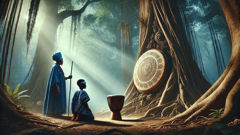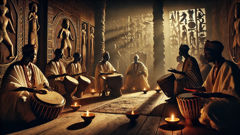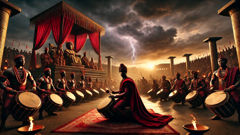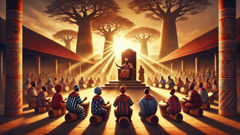Introduction
In the heart of ancient Yorubaland, where the forests grew thick and emerald, and the rivers shimmered like polished bronze beneath the African sun, there lay the great city of Oyo—a city of palaces, shrines, and vibrant marketplaces. Here, the Oba, the king of all Yoruba people, ruled from his palace of red earth and carved timber, his authority both earthly and divine. The kingdom pulsed with music: the laughter of children, the murmur of women weaving, the calls of market traders, and above all, the deep, resonant thunder of drums. These were no ordinary drums, and their keepers were no mere musicians. The sacred drummers of the Oba were chosen from birth, marked by prophecy, and trained in secret traditions passed down through generations. Their rhythms could summon rain, calm tempests, call warriors to arms, and even—so it was whispered—speak directly to the gods that watched over Yorubaland. Each drumbeat was a prayer, each pattern a code, each performance a link in the unbroken chain between heaven and earth. In a world where stories shaped reality and music wove the fabric of fate, the drummers stood at the crossroads of the human and the divine. Their tale is one of honor, danger, jealousy, and wisdom—a legend that has echoed through centuries, shaping the soul of a people. Come closer, and listen to the story of the Oba’s drummers, the guardians of royal power and keepers of the rhythm that holds the world together.
The Chosen Drum: A Birth and a Prophecy
Many generations ago, at a time when gods still wandered the earth in disguise and the ancestors watched closely from beyond, a child named Adewale was born beneath the full moon in a humble compound on the edge of Oyo. His mother, Adesola, was a gentle woman known for her wisdom; his father, Oladipo, a skilled carver of drums for the royal palace. On the night of Adewale’s birth, the wind stilled, and all the village’s drums fell silent. Only one sound remained—the gentle pulsing of Adesola’s heart and the quiet, measured breaths of her newborn son.

As dawn broke, an old woman arrived at their door, cloaked in indigo and carrying a staff carved with ancient sigils. She was Iyalode, the eldest of the drum priestesses, who served as guardian of the Oba’s sacred musicians. Without a word, she took Adewale in her arms, traced a pattern on his brow with white chalk, and declared, “This child bears the mark of Sango, the god of thunder. His hands will awaken drums that speak to gods.” The neighbors whispered, some in awe, others in fear, for a child touched by the orisa was both a blessing and a heavy burden.
Adewale’s childhood was shaped by music and shadow. He learned to walk to the rhythm of his father’s carving mallet, to speak in the measured cadence of drum calls, and to dance in patterns that mirrored the sway of sacred trees in the wind. At night, his dreams were filled with visions: rivers of light, faces of ancestors, and a giant drum that hovered between heaven and earth. As he grew, the city of Oyo grew with him—its streets alive with storytellers and priests, its markets bustling with traders from distant lands, and its palace echoing with the constant heartbeat of drums. Every festival and every crisis called for the drummers, and Adewale watched as they entered the palace, their faces grave, their feet moving in perfect harmony. He yearned to join them, but the path was perilous.
On his twelfth birthday, Iyalode returned, her face creased like the bark of an ancient iroko. She led Adewale to the sacred grove behind the palace—a forest so dense that sunlight barely touched the ground. There, in the dappled gloom, he saw drums unlike any he had known. Some were wrapped in cowhide, others in snakeskin, each one carved with symbols of gods and ancestors. Iyalode placed a drum before him—the iya ilu, the mother drum. “If you are truly chosen, this drum will answer you,” she said.
Adewale knelt, placed his hands on the drumhead, and let his heart guide him. At first, nothing happened. Then, slowly, the air thickened; the leaves trembled; a hush fell over the grove. When he struck the drum, its voice rang out—deep and ancient, echoing through the trees and rippling across the city. The animals paused. The marketplace went quiet. Even the Oba himself felt a chill down his spine. Adewale’s rhythm was not just music; it was language, prophecy, power. Iyalode nodded, satisfied. "You are ready to begin your true training."
From that day on, Adewale became an apprentice to the sacred drummers. He learned their secret codes: how to call the gods with a single phrase, how to send messages to distant villages using drum patterns, how to summon rain or warn of war. He endured long nights of practice, his hands bleeding from the effort, but never once did he falter. The drums became an extension of his soul—each beat a word, each pause a breath. The drummers accepted him as one of their own, and even the older apprentices treated him with respect tinged with fear. For it was clear that Adewale’s gift was more than human.
But gifts such as these often attract enemies as well as friends. Unbeknownst to Adewale, forces both mortal and divine watched him closely, waiting for the moment when power and destiny would collide.
The Rhythm of Power: Secrets of the Sacred Drummers
Years passed, and Adewale grew into a young man of quiet strength and quick wit. Within the palace walls, he was both revered and envied. The Oba’s sacred drummers were more than musicians; they were keepers of secrets—chosen to safeguard the delicate balance between the royal court, the spirits, and the people. Their daily rituals began before dawn, as the mist curled over the city and the first birds called. In a chamber lit by flickering oil lamps, the drummers gathered around a circle of instruments: talking drums (dùndún), bata drums shaped like hourglasses, and the mighty iya ilu.

Adewale’s teacher, Baba Alamu, was a giant of a man with hands as broad as plantain leaves. He taught not just technique but wisdom: how to listen to the voice of a drum before speaking through it; how to read omens in the rhythm of rain on rooftops; how to cloak a warning in a festive song. The drummers spoke in codes—phrases only they understood, layered with meanings that could stir joy or sorrow, hope or fear. When they played for the Oba’s morning council, their rhythms guided decisions and settled disputes. When they played at funerals, their beats guided souls safely to the ancestors.
Yet power is a double-edged blade. As Adewale mastered the art, he learned of old rivalries within the palace—jealousies among courtiers, scheming nobles hungry for influence, and even envious fellow drummers who resented his gift. One night, as he practiced alone in the moonlit hall, he heard whispers behind the carved pillars. He knew not to trust every smiling face or every friendly greeting.
But it wasn’t only humans who coveted the drummers’ secrets. The orisa—gods of thunder, river, earth, and fire—were drawn by the music that bridged their world with the living. Sometimes, as Adewale played in the dark, he felt another presence—an unseen listener who breathed in time with his rhythm. Dreams began to trouble his sleep: Sango, the thunder god, with eyes like lightning; Osun, river goddess, weeping golden tears; Eshu, the trickster, grinning in the shadows. These dreams became warnings.
One festival season, when the rains refused to fall and the river shrank to a muddy trickle, the people grew fearful. The Oba summoned his drummers to the great square and commanded them to call forth rain. Adewale’s hands trembled as he lifted his drum, for he knew that failure could bring shame or even death. He began with a slow, steady beat—a call to Osun, mistress of rivers. The pattern shifted, echoing the rhythms of rain. As his hands danced across the drumhead, clouds gathered above Oyo. Thunder rolled, and lightning crackled. With a final, powerful flourish, Adewale signaled Sango. The heavens opened, drenching the earth in a torrent of silver.
The people cheered, and the Oba bestowed rich gifts on the drummers. Yet that night, Adewale found a feather of pure white on his pillow—a sign from the spirit world that his path would soon cross with powers beyond human understanding. Baba Alamu warned him: “The drum is a bridge, Adewale. Cross it wisely.”
In the weeks that followed, rumors spread of a rival drummer in a distant town who had challenged Oyo’s supremacy. Some whispered that this stranger had learned forbidden rhythms—drumbeats that could enslave spirits or even steal a man’s soul. The Oba grew uneasy. He ordered his sacred drummers to prepare for a contest unlike any before—a contest that would decide not just the fate of Oyo, but the very balance between gods and men.
The Contest of Drums: Spirits, Shadows, and Sacrifice
On the appointed day, Oyo’s great square was transformed into a theater of anticipation. People flooded in from neighboring villages, eager to witness the legendary contest between Adewale and the mysterious challenger from Ijebu. Stalls lined the roads with palm wine and kola nuts; dancers spun in circles, their feet pounding rhythms into the dust. At the heart of it all stood a raised platform draped in crimson and gold. Atop it sat the Oba himself, resplendent in flowing robes and the beaded crown of office. Around him clustered priests, warriors, elders, and every sacred drummer in the land.

The challenger arrived just before sunset, cloaked in black, his face hidden beneath a mask carved with grinning teeth. He called himself Bamidele, and his hands bore scars that told of long years spent mastering forbidden rhythms. It was said he had learned not only from men but from spirits in the wild forests—spirits jealous of mortals who could command the attention of gods.
The contest began with a test of skill: both drummers played the praise songs of ancestors, intricate patterns meant to please both crowd and orisa. Bamidele’s rhythms were sharp and wild; Adewale’s, smooth as river water, weaving ancient wisdom into every note. The people cheered for both, but a strange chill lingered in the air each time Bamidele’s drum sounded.
Next came the test of power. Each drummer was given a single command: to call down a blessing from the heavens. Bamidele went first. His hands flew across the drumhead, unleashing a torrent of noise so fierce it shook dust from the rooftops. Lightning flashed in a sky gone suddenly dark; a flock of crows circled overhead. Some in the crowd gasped in fear.
Then it was Adewale’s turn. He closed his eyes and listened—not just to the crowd or the Oba but to the heartbeat of the earth beneath his feet. His drum spoke quietly at first—a lullaby for children, a prayer for harvest, a promise of peace. Slowly, the sky cleared. A cool breeze swept across the square, and sunlight glinted on every face. Flowers bloomed where his rhythm touched the ground.
But Bamidele was not finished. He began a third pattern—one no mortal should know. His drum throbbed with dark magic; shadows lengthened; the air grew heavy. It was the rhythm of Eshu, the trickster god who guards crossroads and tempts mortals with forbidden choices. As Bamidele’s hands beat faster, a black wind rose from the west, carrying voices not heard since the dawn of time.
Adewale felt fear twist inside him. He remembered Baba Alamu’s warning: "The drum is a bridge." He realized Bamidele’s rhythm threatened to tear that bridge apart. Gathering all his courage, Adewale raised his iya ilu and played the rhythm of Sango—thunder, justice, light. His hands moved in patterns passed down from his father, his teacher, his ancestors. Each beat rang out like a bell of hope.
The sky erupted with thunder. Lightning split the air. A voice—neither wholly human nor wholly divine—spoke through the drum: "Enough!"
Suddenly, the masked challenger collapsed, his drum shattered by unseen force. The wind died. The people fell silent. The Oba rose and declared Adewale victor—not just in skill or power, but in wisdom and restraint. "The true drummer," he proclaimed, "does not seek to rule gods, but to serve harmony between heaven and earth."
That night, as torches flickered and feasting began, Adewale slipped away to the sacred grove. There, among the ancient drums, he poured libation to Sango, Osun, and even Eshu—thanking them for their lessons. He understood now that every rhythm holds both danger and promise, and that true power lies in respect for those who walk unseen beside us.
Conclusion
Years later, Adewale became Iya Ilu—the chief drummer—serving Obas old and new. His rhythms guided not just royal processions but weddings, funerals, and moments of crisis throughout Yorubaland. He taught new apprentices not just how to strike a drum but how to listen—to elders, to ancestors, to the silent wisdom of nature and spirit alike. The legend of his victory over darkness became part of Oyo’s living memory: a tale told beside fires, sung in marketplaces, and whispered in quiet moments when the world felt uncertain. Through Adewale’s humility and courage, the sacred art of drumming remained a living bridge between worlds—a reminder that music is more than sound; it is prayer, prophecy, and protection. Even now, in villages and cities across Nigeria, when the deep drums thunder at festival or mourning, people remember Adewale’s lesson: harmony with the unseen makes a people strong. The legend of the Oba’s drummers endures in every echoing beat—a song of wisdom, balance, and hope.













